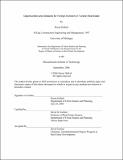Opportunities and obstacles for foreign investors in Turkish real estate
Author(s)
Halkali, Hasan
DownloadFull printable version (2.922Mb)
Other Contributors
Massachusetts Institute of Technology. Dept. of Urban Studies and Planning.
Advisor
David M. Geltner.
Terms of use
Metadata
Show full item recordAbstract
This paper examines the Turkish real estate market from the viewpoint of foreign investors contemplating entering into that market. Since 2002, the government of Turkey has been implementing an aggressive economic reform program within which, foreign direct investment (FDI) plays a crucial role. To attract foreign investments, the government has instituted major reforms in tax and finance laws and has provided incentives to develop many industries including real estate. The underlying question this paper seeks to answer is: What factors make Turkey attractive for foreign commercial real estate investors? To answer this question, I examined the following factors: geopolitical situation, key economic indicators, current state of and forecasts for Turkey's real estate markets, applicable laws, and requirements for establishing a business in Turkey. The research method I utilized for this paper mainly involved literature review. Analysis of government documents, industry reports, law journals, and audio recordings of papers delivered at conferences revealed several factors that could affect the country's real estate markets. (cont.) Turkey's political stability, favorable demographics, established financial structure, increasing economic power, tight monetary and fiscal policies, favorable foreign and domestic investment laws, and prospects for joining the EU make it an attractive target for foreign investors. In contrast, Turkey's large government debt, large external debt repayments, growing current account deficit, and the possible devaluation of its currency present possible threats to the country's future economic prospects. All things considered, Turkey is and should remain an attractive destination for foreign investors in the next several years provided that the Government of Turkey continues to implement the IMF-backed economic program and the process of structural reform necessary for EU accession negotiations.
Description
Thesis (S.M.)--Massachusetts Institute of Technology, Dept. of Urban Studies and Planning, 2006. This electronic version was submitted by the student author. The certified thesis is available in the Institute Archives and Special Collections. Includes bibliographical references (leaves 68-71).
Date issued
2006Department
Massachusetts Institute of Technology. Department of Urban Studies and PlanningPublisher
Massachusetts Institute of Technology
Keywords
Urban Studies and Planning.